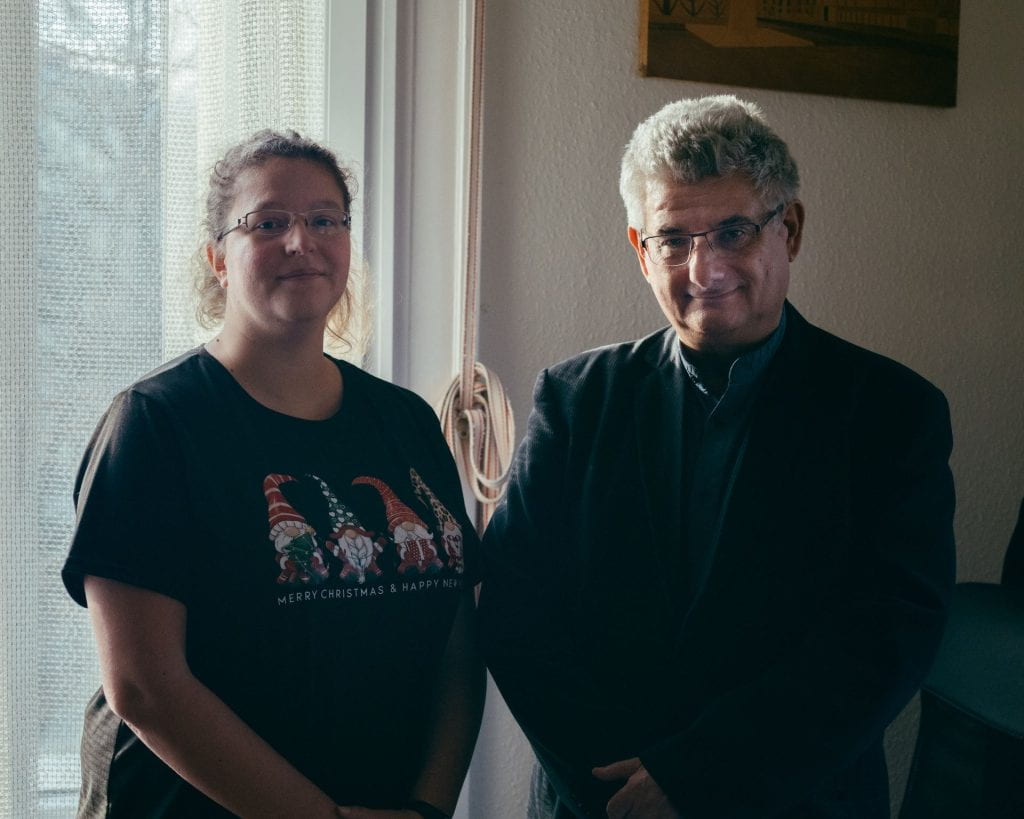Teachers in Hungary are set to enjoy less rights and bear a heavier workload when the new status law comes into effect on 1 January 2024, according to Pedagógusok Szakszervezete (PSZ–SEH), a teachers’ union in Hungary.

President Tamás Totyik (right) and Vice president Tóth Tünde (left) of Pedagógusok Szakszervezete explain issues of the Hungarian education system at their office in Budapest, Hungary on 4/12/2023. (Justin Fung)
Justin Fung
Hungarian teachers nicknamed it the “revenge law”, as they have been going on strikes and protests over the years. Tamás Totyik, the president of the PSZ-SEH, said that protests started in 2010, but the government responded with the new law when it started to escalate.
“We call this the revenge law because it was prepared 2 years after the teachers’ demonstrations started.”
The Bill
With the implementation of the new status law, instead of addressing the issues of low salaries and a high workload, Totyik is concerned that it will further push away existing teachers, and make the industry look less attractive to new graduates.
The report “Teachers’ and school heads’ salaries and allowances in Europe 2021/2022” by Eurydice says that the teachers’ average actual salary level in Hungary, which is in strong correlation to gross domestic product per capita of a country, is below the GDP per capita at all levels of education.
“One of the biggest problems if we look at young teachers is the low salary. Approximately the average monthly salary for young teachers is around €1000. The main problem is that the average graduate salary among young people is about €1500. And it is the [gross] salary. The net salary of young teachers is approximately €660 right now,” Totyik said, while he ironically compares this to the average monthly rent for an apartment in Budapest, which sits at around €500.

Pedagógusok Demokratikus Szakszervezete (PDSZ) compiled a list of 53 changes that the new legislation brings and highlighted notable differences as teachers will no longer be employed as civil servants.
Further increase in burden
Originally, teachers work for 8 hours a day and 40 hours a week. However, the new law raises it to 12 hours a day and 48 hours a week maximum. Teachers also must work 60 hours for free in a school year, with certain working hours being unpaid. For example, if a teacher goes to a theatre with the class or if they go on a trip together, these cannot be paid hours. The academic year can also be extended for a minimum of 180 school days until 15 July to make up for missed school days which are compulsory.
In the event of a protest where substitutes are needed, teachers can now be redirected to another school for up to 9 months to teach without a need for mutual agreement.
Totyik adds that employers only pays for part of the travel fee if a teacher were to be reallocated. The travel fee is approximately Ft50 [€0.13]/km, but the employers only pay Ft13 [€0.034]/km.
Kindergarten teacher Laura Veres, 25, shares how the change adds more burden to the remaining teachers in the system.
“I think the government is not paying much attention to the education system. Teachers have lots of other works out of their working hours, like administration, preparing for the next day, because of the lack of teachers, more teachers have to replace classes, which are not their specialization, and so on. And these extra working hours are not paid at all. The young teachers work only for a few years then leave the path.
Electronic devices
Devices such as laptops and phones, either provided schools and personal ones, can be monitored by the employer. They will also be granted the right to check the social media accounts of teachers.
Loss of rights
Teachers can only go on strike for 50% of their teaching hours. So, they can’t go on strike for a full day. They have to teach at least 50% of their lessons on that day. Or if they are teaching in high schools and have a class with students in their final grade of high school, all the classes have to be held.
The government also created the National Teachers’ Chamber with board members mainly made up of school principals, which made teacher union mere figureheads as the government chooses to communicate with the chamber instead of unions, Totyik describes.
“We would say it’s an anti-employee law. It is to make it harder for teachers to continue the demonstrations.”
Repercussions
The controversial bill provoked an outcry, with 5000 teachers resigning before the deadline to declare resignation on 31 September this year, according to PSZ-SEH.
“Altogether in our education system, in kindergartens, elementary and high schools, there are 146000 teachers. but there should be 170000 teachers”, said Totyik, who is pessimistic about the supply of teachers in the future.
“This year, only 800 young teachers started to teach after they got their degree. 10 years ago, the number of young students who would like to be teachers was 50000. Nowadays, this number is only around 6500. So those who applied for university to become teachers, only every fifth of them stayed in the education system for two years to get their teacher’s degree.”
About 10000 active teachers are those who came out of retirement. In the next 5 years, approximately more than 22000 teachers will be retiring. The average age of teachers has also risen to 53 years old.
“We can’t count on them in the long term. Now the education system is at the edge of its capabilities,” Totyik said.
Mónika Dénes, 38, a teacher of Hungarian, English language and literature, shares a similar view.
“The prestige of the profession has also decreased as everyone with less qualification earns much more than teachers. There are hardly any young people who want to be teachers, and there is a lack of teachers in every area of the country. The school buildings are also in horrible conditions, accidents quite frequently occur, once or twice the ceiling fell off, or when it rains, water pours down from the ceiling. However, the government denies and does not want to deal with the problems.”
The future
On 4 December, interior minister Sándor Pinté said at his annual hearing, before the parliament’s culture committee that a 10% pay raise is definitely in the pipeline, yet not everyone’s salary will be added and it will be performance based.
This is unlikely to be enough to close the gap between the difference in pay between teachers in Hungary and those in other European countries, as vice president of PSZ-SEH Tóth Tünde states that the inflation rate in Hungary of 2023 will be at 17.2% year-over-year according to the European Commission.
“Teachers now are very disappointed as there were demonstrations, but the salary stayed the same. But there is a ray of hope. The entrepreneurs within our economic system realized that these protests will not be good for a long period of time,” Totyik said.
The crippling of the education system could undermine the manufacturing sector which is the biggest contributor of Hungary’s GDP as indicated by the Hungarian Central Statistics Office. Totyik mentioned that in a latest domestic test similar to the PISA test, which is a worldwide study by OECD to evaluate education systems, approximately 40% of Hungarian students cannot understand the text that they are reading. Entrepreneurs and big corporations warned the government that as a result of these bad test results, there will not be enough qualified employees in Hungary.
“For example, the big car manufacturers like Mercedes, Audi etc. These corporations said if the government won’t solve the problem of the education system, they will move their plants to other countries, for example Ukraine,” Totyik added.
Yet teachers like Dénes find it hard to be optimistic, as protests yielded little to no changes.
“Of course, I went to demonstrations, went on strike and committed civil disobedience. There is no communication between the government (the ministry of internal affairs) and teachers or representatives of teachers. If the government started to listen to us teachers, we could be able to discuss and solve at least some of the most severe problems. However, real and effective teaching is becoming more and more unimportant.”
Although earning a salary much better than what state-run schools offer at a private school, Veres sympathises with the uncertainties that teachers at public schools will have to face.
“I wish the government would pay as much attention [to] education as football. The educational system is dying right now, and if there won’t be enough [teachers], then there won’t be education.”
“I am a mother of 3 children, and I do not know who will teach them,” Dénes added.
